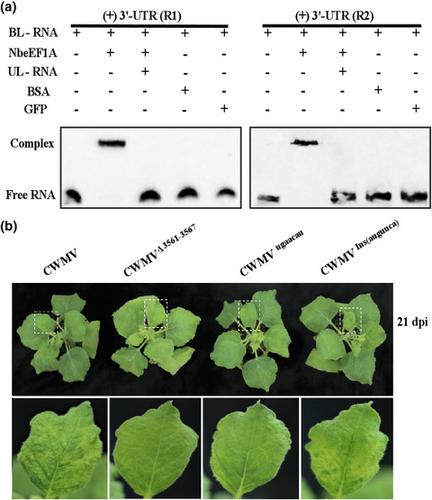当前位置:
X-MOL 学术
›
Mol. Plant Pathol.
›
论文详情
Our official English website, www.x-mol.net, welcomes your feedback! (Note: you will need to create a separate account there.)
Binding between elongation factor 1A and the 3ʹ-UTR of Chinese wheat mosaic virus is crucial for virus infection
Molecular Plant Pathology ( IF 4.9 ) Pub Date : 2021-08-17 , DOI: 10.1111/mpp.13120 Xuan Chen 1, 2, 3 , Long He 2 , Miaoze Xu 2 , Jin Yang 1, 2 , Juan Li 2 , Tianye Zhang 2 , Qiansheng Liao 4 , Hengmu Zhang 3 , Jian Yang 2, 3 , Jianping Chen 1, 2, 3
Molecular Plant Pathology ( IF 4.9 ) Pub Date : 2021-08-17 , DOI: 10.1111/mpp.13120 Xuan Chen 1, 2, 3 , Long He 2 , Miaoze Xu 2 , Jin Yang 1, 2 , Juan Li 2 , Tianye Zhang 2 , Qiansheng Liao 4 , Hengmu Zhang 3 , Jian Yang 2, 3 , Jianping Chen 1, 2, 3
Affiliation

|
The Chinese wheat mosaic virus (CWMV) genome consists of two positive-strand RNAs that are required for CWMV replication and translation. The eukaryotic translation elongation factor (eEF1A) is crucial for the elongation of protein translation in eukaryotes. Here, we show that silencing eEF1A expression in Nicotiana benthamiana plants by performing virus-induced gene silencing can greatly reduce the accumulation of CWMV genomic RNAs, whereas overexpression of eEF1A in plants increases the accumulation of CWMV genomic RNAs. In vivo and in vitro assays showed that eEF1A does not interact with CWMV RNA-dependent RNA polymerase. Electrophoretic mobility shift assays revealed that eEF1A can specifically bind to the 3ʹ-untranslated region (UTR) of CWMV genomic RNAs. By performing mutational analyses, we determined that the conserved region in the 3ʹ-UTR of CWMV genomic RNAs is necessary for CWMV replication and translation, and that the sixth stem-loop (SL-6) in the 3ʹ-UTR of CWMV genomic RNAs plays a key role in CWMV infection. We conclude that eEF1A is an essential host factor for CWMV infection. This finding should help us to develop new strategies for managing CWMV infections in host plants.
更新日期:2021-10-15



























 京公网安备 11010802027423号
京公网安备 11010802027423号